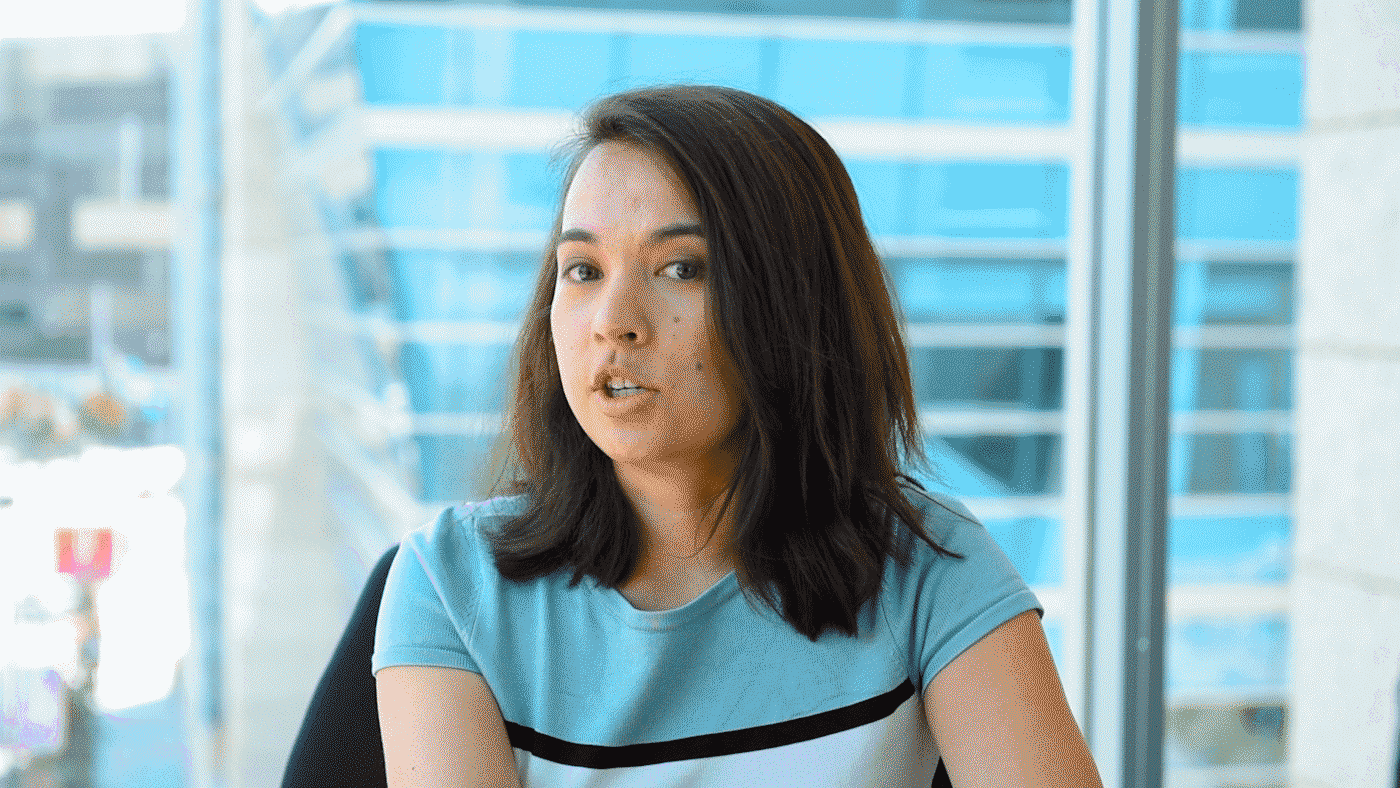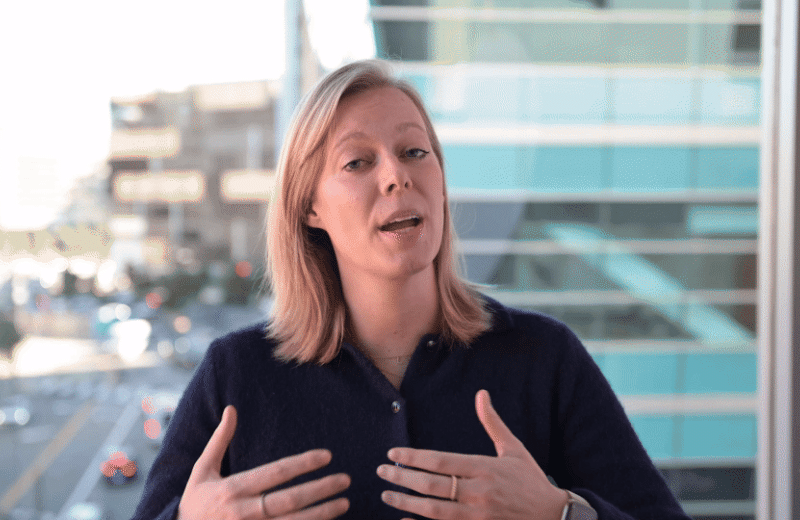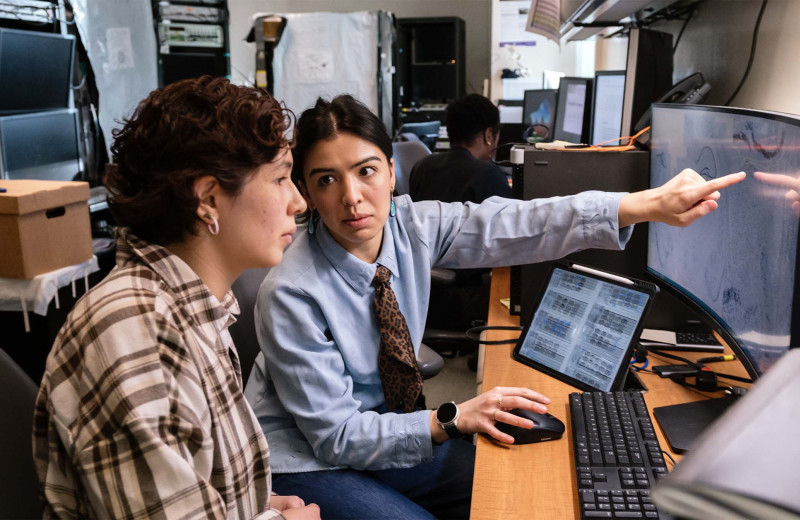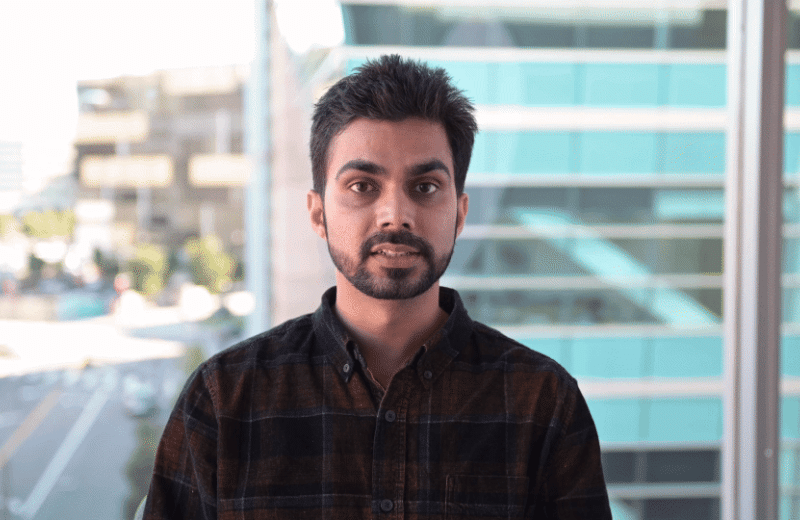Gladstone NOW: The Campaign Join Us on the Journey✕

Sierra Lear, a graduate student in the laboratory of Seth Shipman, is a master foosball player and the editor-in-chief of the Berkeley Science Review.
In addition to working in the laboratory of Seth Shipman, Sierra Lear (she/her) is currently serving as a mentor for Gladstone’s PUMAS (Promoting Underrepresented Minorities Advancing in the Sciences) internship program.
Lear grew up in northern Colorado before receiving dual degrees in chemical engineering and neuroscience from Tulane University in New Orleans in 2018. Immediately afterward, she enrolled as a PhD student in the UC Berkeley-UCSF Graduate Program in Bioengineering as an NSF Graduate Fellow.
What brought you to Gladstone?
I wanted to apply my skill sets in both engineering and neuroscience to create molecular tools that could specifically advance our understanding of the brain. At the time, Seth Shipman had just opened a lab at Gladstone dedicated to that exact purpose, and it felt like a perfect fit.
What do you like about Gladstone?
No walls and kind people. As an introvert, it takes me a bit more time and courage to warm up and reach out to others. Yet, Gladstone encourages such a warm, dynamic culture that I immediately felt comfortable and was able to speak with others sooner than I would have expected from myself. The only secret to becoming a good scientist, I’ve discovered, is finding the right mentors and guides, and being at Gladstone makes it easy to find those people.
Were you interested in science as a child?
Not at all. Growing up with a slight speech impediment, I was instead drawn to reading and writing, or really any way to effectively communicate with other people without talking. My childhood dream was to become a fiction writer or, more fundamentally, a storyteller. In high school, however, I picked up the popular science book This is Your Brain on Music on a lark and learned, for the first time, how good science really is like crafting your own story, just with cells or chemicals or what-have-you as your main characters. From there, my curiosity was piqued.
Why did you decide to go to graduate school?
Graduate school ultimately is not a professional school that trains you for a super specific career, like medical school trains you to be a doctor. Instead, I think graduate school fundamentally trains students in three things: humility, grit, and becoming a life-long learner, all traits I want to foster in myself.
What is your current research?
Mitochondria, the most famous of the different parts of the cell that we learn about in middle school, has more quirks than just being the powerhouse of the cell. It also has its own DNA, completely separate from the DNA that is typically found in the cell’s nucleus. Errors or mutations in nuclear DNA can cause horrible diseases, like sickle cell or Huntington’s disease. Likewise, mistakes in mitochondrial DNA also result in illness, including neurodegenerative diseases like Alzheimer’s or Parkinson’s disease. Thankfully, we have ways to edit or correct mutations in DNA to cure disease, but the tools that we currently use are optimized to only work properly on DNA in the nucleus. My project is to redesign gene-editing tools to travel to the mitochondria and work on mitochondrial DNA instead.
How has the pandemic changed your work?
The pandemic has made my work 50 times harder and easier. Not being allowed within 6 feet of other people has sometimes made it harder to access the people, resources, or training I needed to make some experiments run more smoothly. Simultaneously, when shutdowns first occurred, I had no choice but to take a step back from the daily grind and, rather than go into the lab, reflect a bit. Doing so was against my typical nature, which is sometimes to plow straight ahead without breaks. So the experience allowed me to think more creatively and come up with a novel project idea that I’m now pursuing. It also helped me realize the importance of purposeful breaks to reinvigorate your thinking and scientific approach.
What made you decide to get involved with the PUMAS program? How is your experience going?
I truly believe that the only thing that separates the successful from the rest is proper mentorship. Mentorship also has an absolutely incredible return on investment. If I’m a good scientist, I may make one groundbreaking discovery in a decade. But if I’m a good mentor, in that same decade, I can train 10 good scientists who will then make 10 groundbreaking discoveries. My own path to getting into a PhD program was fairly smooth, and I credit it all to the incredible mentors I found at Tulane and Stanford, where I participated in a PUMAS-like summer research program. These mentors paved the way for my success, patiently steering me away from my failures and toward small wins. This realization has sparked my desire to learn effective mentoring myself. So far, the experience is going well; I’m co-mentoring with my wonderful lab mate Rebecca Fang, and it’s great to compare and contrast our different but complementary mentoring styles. Ultimately, I’m learning just as much from my mentee as she is learning from me, which is the foundation of a good partnership.
What or who influenced your decision to work in science?
As I alluded to before, popular science books. I need to give a special shout out to both This is Your Brain on Music and Why Zebras Don’t Get Ulcers for inspiring an enduring love for neuroscience and teaching me how entangled storytelling, human behavior, and serendipity are in the scientific process; especially when compared to textbooks I grew up with, which often depicted science as something so much more automated. I also have to thank Stu Tobet at Colorado State University, who kindly let me into his lab as a high schooler and patiently put up with me as I broke several glass flasks in a row.
What do you do when you’re not working?
I currently serve as editor in chief of the Berkeley Science Review, a completely graduate student–run magazine and blog that publishes articles describing UC Berkeley-affiliated research and science to the general public. Organizing, writing, and editing pieces for the magazine has been one of the most rewarding aspects of my graduate school life, and—if I’m allowed to throw in a quick plug—I highly recommend everyone to look up berkeleysciencereview.com to learn more about all sorts of cool STEM-related research in Berkeley.
If you could learn to do anything, what would it be?
I would learn how to rollerblade. Growing up, my closest friend loved rollerblading and always wanted to have her birthday parties at the skating rink. Alas, despite all my efforts, I could not go more than 10 seconds without gaining several bruises all over my backside. Perhaps out of concern for my orthopedic well-being, she refused to hold her birthday celebrations at the rink so I could be included in the festivities. Someday, I would like to give back and give her the birthday party of her dreams (plus get some more regular exercise).
What is your hidden or unique talent?
My enduring legacy amongst my peers at the different research experiences and internships I’ve attended are my formidable foosball skills. Despite numerous score handicaps and having to compete 1-on-3, I could not be bested. In time, I hope to encourage my oddly foosball-specific hand-eye coordination to transfer to fast and accurate pipetting at the lab bench.
If you could meet any scientist from any point in time, who would it be and why?
I’m tempted to say Thomas Kuhn, whose book The Structure of Scientific Revolutions finally taught me what a paradigm shift was, but I think he technically qualifies as a philosopher rather than a scientist. So I’ll say Joshua Schimel, instead. He wrote one of the most humorous and practical books I’ve ever read on how to write good science. Broadly, I’m intrigued by any scientist who finds the time to publish books aimed at a more general audience alongside their academic work, because it mirrors my own dream of someday publishing my own books to inspire late scientific bloomers like myself to embrace science.
Want to Join the Team?
Our people are our most important asset. We offer a wide array of career opportunities both in our administrative offices and in our labs.
Explore CareersMeet Gladstone: Alisa Dietl
Meet Gladstone: Alisa Dietl
Alisa Dietl brings her international training and clinical perspective to Gladstone, where she works to engineer more effective cancer immunotherapies for solid tumors.
Graduate Students and Postdocs Profile Cancer Pelka LabVoices of Outstanding Mentorship
Voices of Outstanding Mentorship
Three recipients of Gladstone’s Outstanding Mentoring Award share their personal approaches to mentorship and reflect how this passion has shaped their own growth as leaders.
Profile Roan Lab Graduate Students and PostdocsMeet Gladstone: Shyam Jinagal
Meet Gladstone: Shyam Jinagal
Shyam Jinagal explores how genetics, aging, and regeneration shape the heart—and how those insights could one day restore heart function after injury.
Graduate Students and Postdocs Profile Cardiovascular Disease Srivastava Lab



